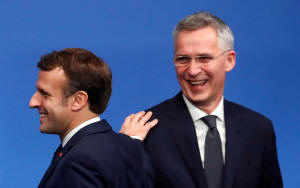Exclusive: France resists more joint funding of 'brain dead' NATO
 Send a link to a friend
Send a link to a friend
 [May 28, 2021]
By Robin Emmott, Sabine Siebold and Tangi SalaŁn [May 28, 2021]
By Robin Emmott, Sabine Siebold and Tangi SalaŁn
BRUSSELS/PARIS (Reuters) - A $20 billion
plan to give NATO more flexibility in facing military threats, climate
change and China's rise has hit firm resistance from France, which fears
the move could undermine its defence priorities, four diplomats and a
French defence source said.
NATO Secretary-General Jens Stoltenberg proposed in February that allies
put more money directly into existing, albeit small common budgets,
rather than rely on the current system that each government pays for its
own military operations.
That was a response to long-standing tensions with the United States
which says European allies do not contribute enough to their own defence.
A deal at a June 14 summit with U.S. President Joe Biden would likely
shore up transatlantic unity, two of the four diplomats who spoke to
Reuters said.

The proposal also seeks to heed French President Emmanuel Macron's 2019
warning that NATO was "brain dead" because the alliance, formed in 1949
to contain a military threat from the Soviet Union, lacked a clear
political strategy in the post-Cold War, multipolar world.
But France believes the idea - which the diplomats said was to put some
$20 billion into common budgets over 10 years - is unlikely to benefit
French military priorities and risks diverting attention and resources
away from building up weak defence capabilities among European Union
member states.
Most of them are also part of NATO.
"If the idea is to brutally increase the contribution of countries to
common budgets and change the philosophy of NATO, moving from national
responsibility to the dilution of responsibility, France's response will
be clearly no," a French armed forces ministry source told Reuters.
The EU has been working since December 2017 to develop more firepower
independently of the United States, led by France, the EU's remaining
major military power after Britain left the bloc.
"For us, it is not an issue of NATO versus Europe but NATO versus the
national defence of each member state," the French armed forces ministry
source said.
The source said Paris was still open to hearing counter arguments and
details, however. France already meets NATO's target to spend 2% of
economic output on defence.
[to top of second column]
|

French President Emmanuel Macron and NATO Secretary General Jens
Stoltenberg react at a NATO summit meeting n Watford, Britain
December 4, 2019. REUTERS/Christian Hartmann/Pool

One of the four diplomats said French Armed Forces
Minister Florence Parly was upset by Stoltenberg's decision to go
public in February with the outline of his proposal. Stoltenberg met
Macron in Paris on May 21, praising the French president for
France's "significant defence investment".
A NATO official told Reuters that pre-summit negotiations were
constructive and that NATO foreign and defence ministers would
discuss the proposal, part of Stoltenberg's NATO 2030 reform
package, when they convene on June 1.
MORE AMBITION
Germany and other European allies, as well as Canada, also want to
know what any extra money would be spent on before they loosen their
purse strings. The summit with Biden may only agree to carry out an
analysis of common funding, the diplomats said.
"Some Europeans are asking: do we build up NATO, or do we develop
the EU's defence capacity to complement NATO?" said a senior NATO
diplomat. "Each euro can only be spent once."
Stoltenberg, a former Norwegian prime minister, suggested that
allies fund collectively more of their deterrent operations on
allied territory, rather than the current system that a single ally
bears all the costs of a deployment.
Allies could invest in upgrading allied bases to adapt to climate
change, protecting telecoms and computer networks against cyber
attackers and in space. Stoltenberg said in February: "If we want to
do more, we also need more resources."

NATO common-funded budgets amount to 0.3% of total allied defence
spending, or some $2.5 billion, to run NATO commands and military
infrastructure. That figure is lower than NATO's historical average
of about 0.5%, the diplomats said.
(Writing by Robin Emmott; Editing by Mark Heinrich)
[© 2021 Thomson Reuters. All rights
reserved.] Copyright 2021 Reuters. All rights reserved. This material may not be published,
broadcast, rewritten or redistributed.
Thompson Reuters is solely responsible for this content. |